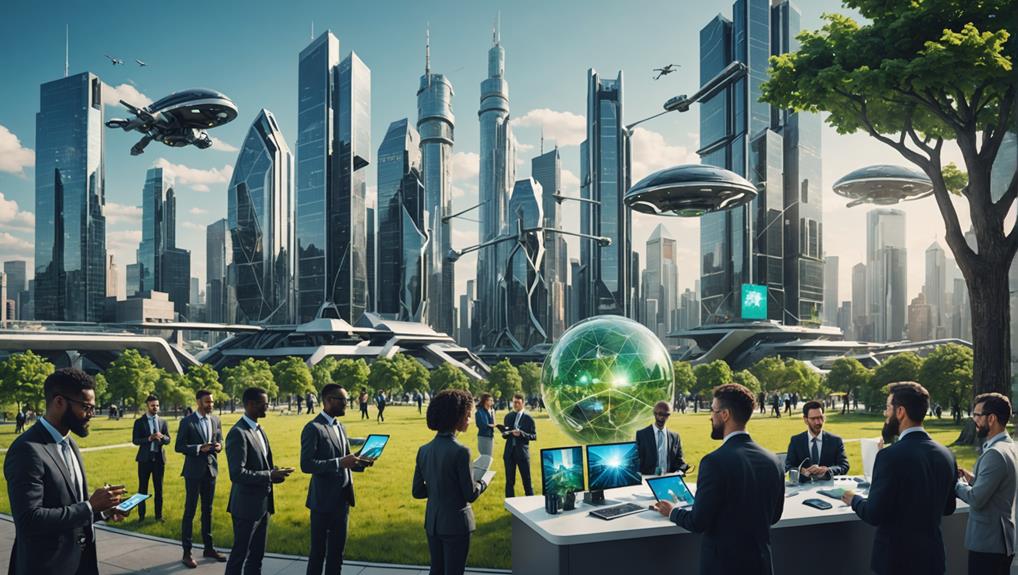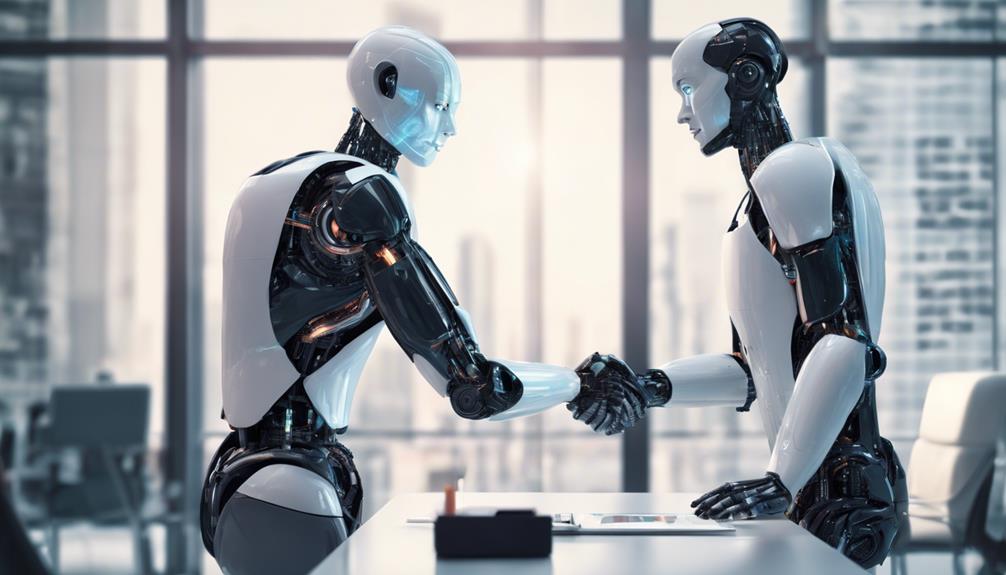
As you look ahead, LinkedIn's anticipated industry trends suggest a dynamic shift in the workplace landscape that you'll want to stay ahead of. Remote work is not just a temporary arrangement but evolving into a global phenomenon that demands new skills in time management and remote team collaboration. At the same time, sustainability is climbing the corporate ladder, with green technology becoming integral in various sectors. This pivot not only changes how businesses operate but also which skills are in high demand. Are you prepared to adapt to these emerging trends? Let's explore how these changes could reshape your professional world.
Remote Work Evolution

Remote work has transformed the landscape of employment, allowing you to connect with your job from virtually anywhere. This shift isn't just a trend; it's quickly becoming the norm.
You've likely noticed how boundaries between work and home have blurred, making it essential for you to manage your time and space more effectively.
With companies worldwide embracing telecommuting, you're not confined to jobs in your immediate geographic area, broadening your career opportunities exponentially. You can work for a Silicon Valley tech giant, a London financial firm, or a Sydney startup, all without leaving your hometown.
This globalization of job opportunities also means you're competing with a much wider pool of candidates.
Skills in digital communication, self-discipline, and remote collaboration have become crucial. You need to master various digital tools and platforms to stay productive and connected.
Moreover, employers now seek those who can thrive in a remote environment, highlighting the importance of showcasing your ability to work independently and proactively.
As remote work continues to evolve, staying adaptable and continually upgrading your skills will help you stay ahead.
Make sure you're equipped not just technically, but also mentally and environmentally, to meet the challenges of this new work frontier.
Green Technology Advancements
Nearly every industry is now integrating green technology to mitigate environmental impact and improve efficiency. As you navigate your career or business, it's crucial to understand how these advancements can benefit you.
In construction, for example, green building materials such as recycled steel and insulating concrete forms are becoming the norm rather than the exception. You'll see energy costs plummet with the adoption of smart windows that adjust to sunlight, vastly reducing heating and cooling expenses.
The automotive industry is also shifting gears towards sustainability. Electric vehicles (EVs) aren't just trendy; they're essential to reducing greenhouse gas emissions. You might consider the growing market for EVs as a fertile ground for career opportunities or business expansion.
Renewable energy sources like solar and wind are no longer future possibilities but present realities. These technologies aren't just for large corporations.
Small businesses and startups are uniquely positioned to innovate, providing you with opportunities to join or start ventures that focus on sustainable solutions.
AI and Automation Impact

As industries evolve, the impact of AI and automation is becoming increasingly profound.
You're seeing these technologies reshape every sector, from manufacturing to marketing. They're not just about replacing manual work anymore; they're enhancing capabilities and creating new opportunities.
In your field, AI tools can analyze data at a speed and accuracy that's impossible for humans alone. This means you can make faster, more informed decisions.
Automation is streamlining tasks that used to eat up your time, freeing you up for strategic thinking and innovation. It's not just about working harder, but smarter.
But it's not all smooth sailing. With AI and automation, there's a challenge of keeping your skills relevant.
You've got to stay on top of the latest developments and continually adapt your expertise. The demand for tech-savvy professionals is skyrocketing, and you might find yourself needing to upskill to keep pace with the evolving job market.
Focus on Mental Health
Shifting focus to mental health, it's clear that the modern workplace must prioritize this critical aspect. You're likely familiar with the growing conversation around mental well-being, and it's becoming a pivotal factor in job selection and retention.
As you navigate your career path, you'll find that companies increasingly embed mental health strategies into their culture. This isn't just about offering days off or support hotlines anymore. It's about creating an environment where you can openly discuss mental health without fear of stigma.
You'll see more firms integrating regular mental health breaks and promoting flexible work arrangements that allow for work-life balance. Think about how this can significantly reduce burnout and improve overall job satisfaction.
The emphasis on mental health also means access to professional mental health services will become a standard benefit. This can make a huge difference in your daily work life.
Moreover, leadership training now often includes components on recognizing and addressing mental health issues. This equips your leaders to better support you and your colleagues, fostering a healthier workplace environment.
As you move forward, remember that your mental health isn't just a personal issue but a professional priority that companies are starting to recognize and act upon.
Diversity and Inclusion Initiatives

Building on the importance of mental health, it's also vital to consider how diversity and inclusion initiatives are shaping the workplace. You've likely seen companies increasingly prioritize these efforts, but what does this trend mean for you?
Firstly, you're entering a work environment that values varied perspectives more than ever. This isn't just about meeting quotas or being politically correct; it's about enriching the workplace with diverse insights that enhance creativity and decision-making.
As these initiatives evolve, you'll notice a more welcoming atmosphere where everyone, regardless of their background, feels valued and has an equal opportunity to succeed.
Moreover, you're likely to see policies and training focusing more on cultural competency. This means not only will you need to be aware of your own biases, but you'll also be expected to actively participate in creating an inclusive culture. This can involve everything from the language you use in meetings to how you approach team collaborations.
Embrace this shift. It's not just good ethics; it's good business. Companies that champion diversity and inclusion tend to perform better, innovate more, and attract top talent.
Skills and Learning Development
To keep pace with evolving industry demands, you'll need to continuously develop new skills and knowledge. In the rapidly changing job market, your ability to adapt through learning is more crucial than ever.
LinkedIn's future trends suggest a significant shift towards continuous, integrated learning frameworks within industries. This isn't just about taking occasional training sessions; it's about embedding a culture of constant learning in your daily work life.
You'll see more companies investing in learning management systems (LMS) and platforms that offer personalized learning experiences. These tools aren't just for acquiring new technical skills but also for honing soft skills like leadership, communication, and strategic thinking.
The expectation isn't just to learn but to apply this knowledge dynamically as market conditions change.
Moreover, peer-to-peer learning and mentorship will become key components of professional development. You'll likely find yourself both teaching and learning from your colleagues in a more formalized way.
This approach not only enhances your skills but also fosters a collaborative and supportive work environment.
Frequently Asked Questions
How Will Linkedin Influence Small Businesses in the Future?
LinkedIn will significantly boost your small business by enhancing visibility, networking opportunities, and access to industry insights. You'll connect effortlessly with peers and potential customers, driving growth and innovation in your niche.
What Policies Is Linkedin Implementing to Protect User Data?
LinkedIn's implementing stronger encryption and tighter access controls to protect your data. They're also rolling out more transparent privacy policies, ensuring you understand how your information is used and secured.
How Will Linkedin Address Fluctuating Global Economic Conditions?
You'll see LinkedIn adjusting strategies to tackle fluctuating economic conditions by enhancing job market analytics and providing resources for skill development, ensuring users stay competitive and businesses can adapt to changing economic landscapes.
What Are Linkedin's Strategies for Competitive Differentiation?
LinkedIn's strategies for competitive differentiation focus on leveraging advanced analytics and AI to tailor user experiences. They're enhancing networking tools and expanding learning resources to stand out in the competitive social platform market.
How Is Linkedin Planning to Expand Its Global Reach?
LinkedIn's planning to expand globally by partnering with local businesses, tailoring services to regional needs, and enhancing language support. You'll see more localized content and greater accessibility, making it easier to connect worldwide.
Conclusion
You'll need to stay agile as industries transform. Embrace remote work to tap into global opportunities and manage your time effectively. Dive into green technologies—it's not just an option but a necessity. With AI and automation changing the game, upgrading your tech skills is crucial. Remember, prioritizing mental health and fostering inclusivity aren't just trends; they're essential practices. Keep learning and evolving; your adaptability is your strongest asset in this dynamic professional landscape.






